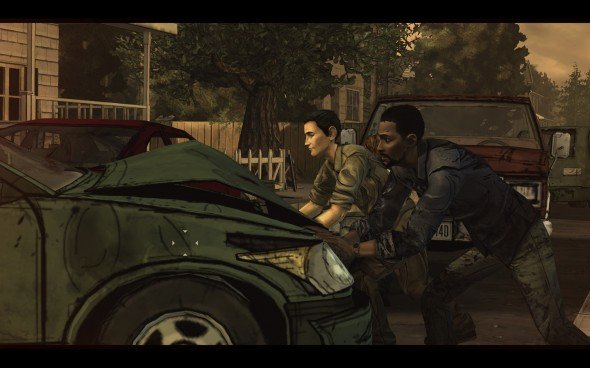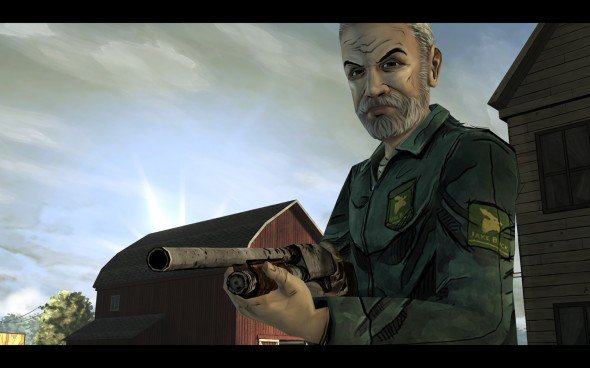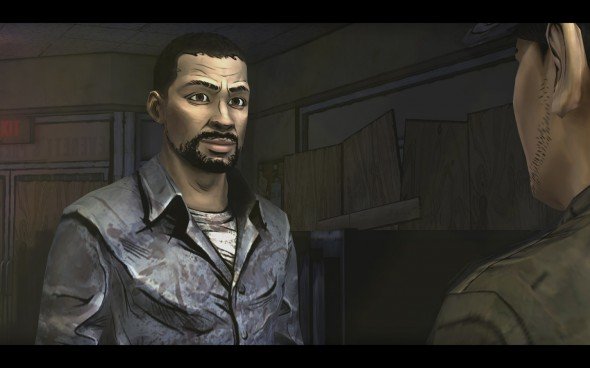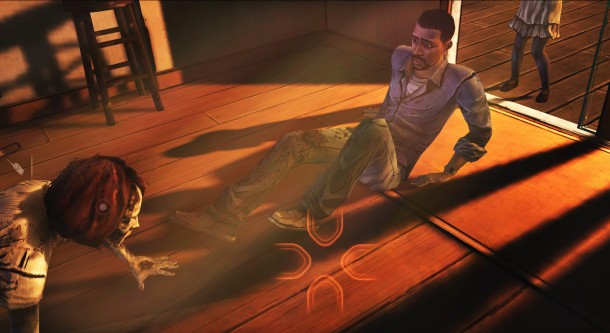Our Verdict
By some creative miracle, modest difficulty and interaction are outweighed by genuinely great survival storytelling.
PC Gamer's got your back
Adapting something already-beloved into a game isn't a job anyone should want. Games have their own set of restrictions and expectations, and designing around those while trying to execute your own creative vision tends to create compromises scary enough to dress up as for Halloween.
It's a creative miracle, then, that Telltale avoids the error made by something like the Watchmen film. It doesn't exist for the sake of homaging itself; it isn't hyper-loyal to its source material for the sake of appeasing ComicCon attendees who threaten to blow their This Isn't Canon Whistle.
A parallel story to those already told on TV and in print, Telltale lets the tone of Robert Kirkman's graphic novel naturally inform and inspire the game's design. The result is novel, focused and emotionally engaging in a way that's totally disproportionate to the two hours and 20 minutes it took me to complete.

Interactivity does take a purposeful backseat to storytelling. TWD operates more as an interactive TV episode than a conventional adventure game. You never run from zombies in real-time. Puzzle solutions are transparent. Interstitial scenes take control away from you entirely.
But I don't see player freedom as the game's function. By sweeping away almost all of the work of item-gathering and riddle-unraveling that some of us associate with adventure games, what's left is pure presentation and breathless drama. Going through the game's motions (in part thanks to animations, and the best art Telltale has generated since Sam & Max: The Devil's Playhouse) roots you in the world. It takes no brainpower to put batteries into a radio or hand an energy bar to a shaken stranger, for example, but these acts reinforce your sense of helplessness and reliance on simple resources.

The Walking Dead's light interaction only began to bother me in later zombie encounters, where the ease of timing a single click at a large target to deliver an axe strike to a zombie's skull started to wear on me. The nervousness produced by these encounters will diminish if Telltale overuses this template for zombie combat in future episodes. Telltale does show restraint with keyboard quick-time events, which are used sparingly to stir tension. Unlike the developer's other recent conversion, Jurassic Park (which we did not like ), The Walking Dead doesn't structure itself as a theme park ride that you convince not to kill you by tapping your keyboard. Not much of the game is centered on avoiding a game over state. Otherwise, the final 15 minutes of the game felt a little compressed to me; one or two moments of interaction in place of (or in addition to) cutscenes at the end would've been welcome.
I barely felt challenged. I died once. But I did feel entirely engaged. What dominates the first episode is the sense that you're planting seeds in a zombie garden that you actually care about. Relatable characters are the basis of that connection. You encounter ordinary people dealing with unbelievable circumstances that are made believable by grounded dramatic writing. I wanted to know more about someone's wife. I felt suspicious of strangers. I rooted for a brave IT guy. Telltale doesn't clone existing archetypes from The Walking Dead fiction (although Glenn and the Greene family make cameos); Lee, the main character in this spin-off, is as likeable and imperfect as Rick Grimes or Dale Horvath.
Keep up to date with the most important stories and the best deals, as picked by the PC Gamer team.

I've watched the entirety of the TV series and read most of the comics; I can't imagine a better take on the game's source material than this. As long as Telltale doesn't recycle too many interactive sequences in future episodes, I can't imagine regretting spending $25 upfront for the five-part series. A lot of the game's value lies in the conversations I've had with other players. They feel a lot like the discussions I have with fellow watchers of Game of Thrones or Mad Men, except we can talk about how our decisions differed and speculate on how that'll influence next month's episode.
I'd encourage playing with "minimal" mode turned on, doing so hides pop-ups that tell you when you've made a story-affecting decision, which puts you in a position to make choices that feel natural to you, rather than being conscious of what variable you're changing in the game's save file.
Note: Compressed voice-over audio was an issue in the version of the game that originally released on Steam. This issue was patched during our review.
By some creative miracle, modest difficulty and interaction are outweighed by genuinely great survival storytelling.

Evan's a hardcore FPS enthusiast who joined PC Gamer way back in 2008. After an era spent publishing reviews, news, and cover features, he now oversees editorial operations for PC Gamer worldwide, including setting policy, training, and editing stories written by the wider team. His most-played FPSes are Hunt: Showdown, Team Fortress 2, Team Fortress Classic, Rainbow Six Siege, and Counter-Strike. His first multiplayer FPS was Quake 2, played on serial LAN in his uncle's basement, the ideal conditions for instilling a lifelong fondness for fragging.


